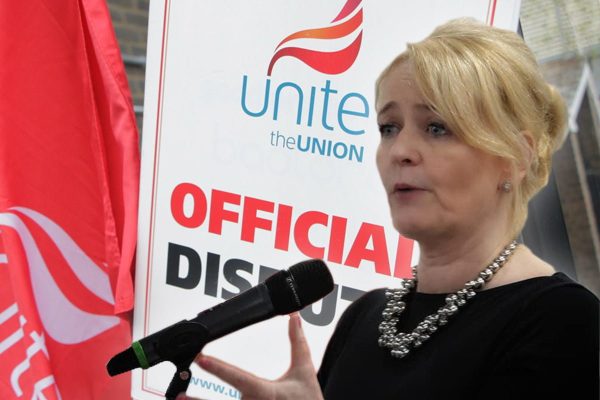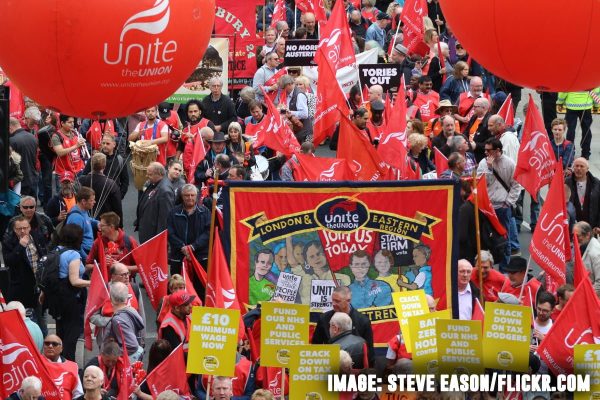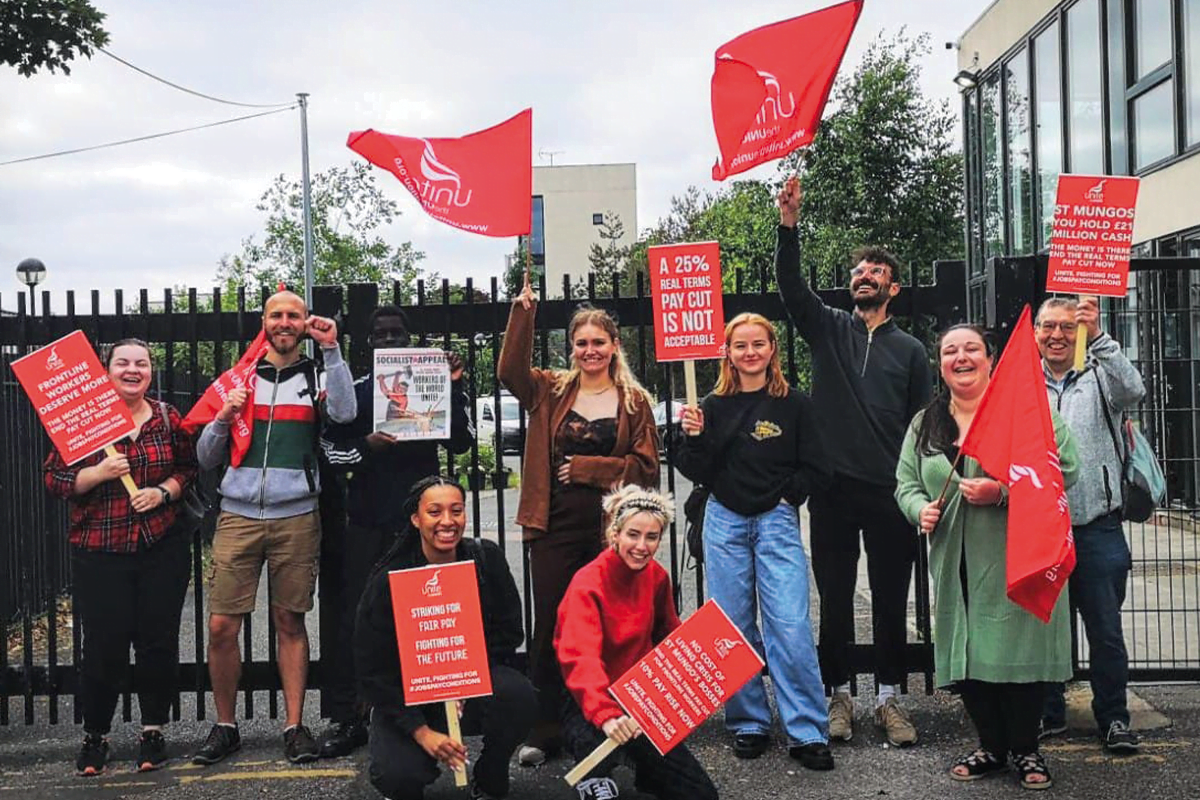Frontline workers at charity St Mungo’s support people facing homelessness and housing problems. In a cruel irony, however, many are facing the same problems themselves, as the cost-of-living crisis deepens.
The charity workers’ latest pay offer of 2.25%, described as “pitiful” by Unite general secretary Sharon Graham, is the latest in a long line of meagre, below-inflation offers from St Mungo’s management.
This insult from the bosses has rightly angered these workers. In response, they have roundly rejected this offer, and have launched a month-long campaign of action, starting yesterday (30 May).
Callous bosses
The pay dispute at St Mungo’s has remained unresolved since 2021. According to Sharon Graham, this is thanks to “astonishing management indifference” towards the workers’ plight, with many struggling to afford their bills and rent.
 Indeed, the last decade has seen frontline workers’ pay plummet by 25%. Senior management, meanwhile, are living on another planet. They have seen their own pay skyrocket by 350% over the same ten-year period.
Indeed, the last decade has seen frontline workers’ pay plummet by 25%. Senior management, meanwhile, are living on another planet. They have seen their own pay skyrocket by 350% over the same ten-year period.
St Mungo’s even refused to reveal the salary of the newly-appointed CEO, whose predecessor took home £189,000, perhaps fearing the furious response that this astronomical sum would rightly provoke.
Speaking to Socialist Appeal activists at a picket in Hither Green, South London, one worker explained that the charity’s new boss, when confronted about unsustainably high workloads and low pay, had suggested that staff take an hour each week for a ‘wellbeing session’, in order to chill out and eat yoghurt!
The utter heartlessness of the bosses – who hide behind their charitable status to attack workers – is now backfiring. This drawn-out dispute has seen new members joining the union “in droves”.
Mood of anger
Responding to management’s latest pay offer, 500 workers were balloted across London and southern England. They rejected this by a margin of 91%.
Rising anger has steeled workers’ resolve to fight until victory. The month-long strike will undoubtedly be all the stronger and more determined for it.
The workers are also receiving increasing support from hostel residents, who directly feel the impact of high burnout rates amongst staff. They can see clearly for themselves that the bosses are to blame for this.
These same bosses, meanwhile, are on a warpath. In the run-up to the strike, they cancelled workers’ shifts and brought in agency staff, in an attempt to divide the workers.
Unite had planned for the walkout to take place over two pay periods, in order to spread out the impact on striking workers. But spiteful management have suddenly changed their payday for wages, meaning that workers will now lose almost an entire month’s pay.
Breaking point
This strike is truly unprecedented in the charity sector, which has very rarely been affected by industrial action in the past.
An article published by the Charity Times magazine last winter, titled “charity staff strikes: why now?”, explains that the “rewarding nature” of this altruistic work had historically led workers to “settle for less”.
 But this goodwill clearly has its limits. And the bosses’ attempts to maintain this downward pressure on pay is beginning to meet resistance.
But this goodwill clearly has its limits. And the bosses’ attempts to maintain this downward pressure on pay is beginning to meet resistance.
The first months of the pandemic in 2020 saw tens of thousands of charity workers laid-off. And since then, the struggle to keep up with rising living costs and workloads has steadily increased.
This process is made worse by a vicious cycle of unfilled vacancies and increased burnout, as one charity sector report outlines.
As the example of St Mungo’s highlights, meanwhile, senior management pay remains ‘competitive’. In other words it is workers who are being made to pay for the looming crisis in the sector.
Unite and fight
This has led to growing militancy among some charity workers, who realise that the only way to protect their pay, and the people who rely on the essential services that they provide, is to stand up and fight.
Last December saw a mini strike wave within the sector. Community support workers at Hestia went out for the first time in the charity’s 50 year history. Workers at a Birmingham asylum support charity fought management to keep their doors open. And a two-week strike at housing charity Shelter – involving 600 workers – won an increased pay offer.
These bold examples show what’s possible. And the militancy of the St Mungo’s workers shows the way forward. Now we must link up the struggles.
Unite members in local government, including housing workers, are also preparing to ballot for strike action this summer.
Union leaders should use this opportunity to coordinate strike action, and to take a united stand against cuts to public services and housing, and to attacks on both charity and public-sector workers.
These battles should be forged together around a bold socialist programme: for a mass house-building campaign, funded by the nationalisation – without compensation – of the major landlords, finance houses, and property developers.
Such a vision would electrify council workers, charity staff, and renters alike.
Socialist solution
This united fight is needed now more than ever. Ultimately, cuts to local government and the £5bn fall in charitable donations are both a reflection of the same deepening crisis of capitalism.
 There can be no solution to the housing crisis in Britain – with the imminent threat of one million evictions, and the scourge of mouldy homes and modern-day slums – within the confines of this rotten system.
There can be no solution to the housing crisis in Britain – with the imminent threat of one million evictions, and the scourge of mouldy homes and modern-day slums – within the confines of this rotten system.
The actions of charity bosses have made it perfectly clear that their priority, first and foremost, is to defend this decrepit system, which makes the working class pay to help the homeless, while parasitic investors and speculators hoard empty houses.
Workers must unite and fight. We say: Expropriate the landlords, bankers, and billionaires! For a socialist solution to the housing crisis!
Interview with a striking St Mungo’s worker
Daniel Morley
St Mungos workers held an impressive rally outside Hackney Town Hall on Thursday 1 June, as part of their month-long strike for an improved pay deal. Hundreds of workers and supporters were in attendance to hear speeches from the strikers and other trade unionists.
The mood was upbeat and determined, especially with all the solidarity shown from the rest of the labour movement.
Comrades from Socialist Appeal were present to show solidarity. We interviewed local rep Ailsa about the strike.
Could you explain what you’re fighting for and why?
We’re Unite members at St Mungos, and we’re fighting for a 10 percent pay increase, dating back to the financial year 2021. Over the last 19 years, collectively, our real-term salaries have decreased by between 25 to 30 percent, depending where you are on the scale.
That is a sector-wide truth. However, that is only applicable to people on the lower end of the pay scale – in contrast to our senior managers and our executive teams, whose funds over that time have increased by about 350 percent!
The funding is not going where it needs to be. It needs to be with the frontline workers.
During the pandemic, we were like the hidden fourth emergency service; we were essential workers. I joined halfway through the pandemic – and I tell you, even that was stressful enough, just doing it from halfway through.
For all our hard work and sacrifice in that time, all we got from management was a thank you. We got a clap. We have members of our staff going to food banks.
A lot of our members are so poorly paid that they are anxious about striking, because they can’t afford to. Some people I’ve spoken to say they can’t afford to join the union. The fact that people can’t afford £16 a month to join the union, which is there to support them – that’s shocking.
It is outrageous that people working a full-time job, helping the most vulnerable people in society, can’t afford to be a member of their union. So we want a 10% wage increase, backdated to the year 2021.
Do you think that the management is taking advantage of the fact that charity workers care about what they do, and sometimes might feel guilty for asking for more money? At the same time, a lot of people are really shocked to find out how much the CEOs of charities get paid.
I was a union sceptic; well, not a sceptic, but I was ignorant about unions when I first joined Mungos.
I then spoke to the workers here, and they educated me that charities are not innocent. NGOs and charities: a lot of the time they are just as bad in terms of pay and inequality as for-profit companies.
Much like the government is with NHS workers and medics, they rely on the fact that such workers will go out of their way to help people, and will make a lot of sacrifices. They’re also relying heavily on agency workers to plug gaps.
There seems to be so much complacency around the fact that they’re using agency workers so much. These temporary workers hold up our services a lot of the time, but they don’t get to know the people we look after as well. Agency workers also work very hard, however, and they should also have rights.
You can’t say we don’t have money, and then take home £189,000 a year, as our CEO does. If they took a big pay cut, I doubt as many of us would have voted to strike.
They also need to show us the accounts, to prove there’s no money. We can see in their latest report that they have £4.5 million in reserves. But when we point this out, they say, “no, we don’t have it”. So where did those reserves go then? Show us!
The demand for capitalists to ‘open the books’ has often been a key demand of a militant labour movement. That demand puts the bosses on the spot and exposes them, and obviously the capitalists don’t want that; they want to keep control of everything.
Absolutely. One turning point was a few months ago in the midst of our campaign. [The employers] kept coming back with “there’s no more money”. But then they created a whole new department, called the ‘department of transformation’, whatever that means, and the director of that is on £130,000 a year!
The execs are much better off than the frontline workers. And they are losing frontline workers. In my team alone, I’ve had three key members go to the council because the council pays better.
We do a lot of really hard work here, and we’re not valued; they’re not valuing the frontline workers, night workers, and cleaners – you know, project workers. They are some of the lowest paid within the organisation, and if they weren’t there, then we wouldn’t be able to function.
How can you win this struggle? It seems like you’ve got a very good turnout today, and a confident mood – so how are you going to use that to win?
We’re doing an awesome job. Over the past few months, we have seen our membership grow by hundreds. When I first joined it was about 200-300 members less than what it is now. That’s only in a matter of months, and it’s growing every single day.
I think people are really disappointed by the response that we’ve had from management. The less management shows a real understanding and compromise, the more angry and organised we’ll get.
We don’t want to be here; we don’t want to be on strike. But the energy is awesome. People are getting more and more angry by the day. Also [people are striking] because everything’s costing more and more. People who bought a house two years ago, their mortgage is now four-and-a-half times what it was.
I’m a first-time striker. I’m a first-time rep. So, I’m learning loads. But I wouldn’t do this if I felt like I was being taken for a ride.
We’re going to be out here picketing every single day, for four weeks. I think they think we’re going to buckle, but we won’t.
I think the labour movement can learn from your strike – from the fact that you are going on strike for four weeks solid. That is the way to win, because it hurts the employer and it shows that you’re determined to win.
We are determined. More and more people are joining the picket line every day. On the first night of the strike, we had lots of frontline night workers leave at midnight, on the dot. That was wonderful. We’re really solid. Yeah, really confident, I think.






